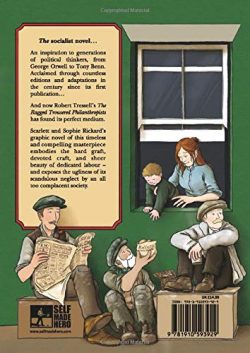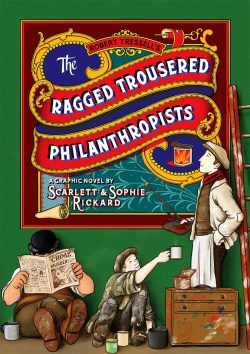

By Robert Tressell; adapted by Scarlett & Sophie Rickard (SelfMadeHero)
ISBN: 978-1-910593-92-9 (TPB/Digital edition)
Born in Dublin to unfavourable circumstances, Robert Croker – AKA Robert Noonan – (17 April 1870 – 3 February 1911) was a man of many parts. His short, globetrotting, eventful life ended with him a housepainter and signwriter (a skilled trade) dying of tuberculosis in The Liverpool Royal Infirmary in 1911.
In all likelihood nobody today would remember him if he hadn’t spent his off hours in the declining years of 1906 to 1910 writing a book. He failed to have it published in his lifetime, but his daughter Kathleen Noonan persevered and a first (heavily edited, highly abridged and politically redacted) version was released on April 23 1914 – four months before the Great War began. That clash resulted in a changed planet and the first socialist (sic) state…
The full manuscript didn’t reach the public until 1955. Even bowdlerized editions were potent enough to make it one of the most important books of the century. Released under the nom de plume Robert Tressell, the cultural satire and barely-disguised socialist polemic was The Ragged Trousered Philanthropists.
After reading the million plus-selling, never out-of-print pioneering prose opus of working class literature, you should research the times it was set in and read up on the author, if you want to see how a fascinating man responded to the injustice of his world. There’s a splendid Afterword by the creators in this hefty graphic novel to get you started…
A more jaded person might assume current businesses and governments have also studied the text, with a view to rolling back all the hard-won advances made since then, returning us to the days where workers toiled in a brutal gig economy without safety nets of social housing, medicine or pensions. Work or die was the way of world and it’s well on its way back…
The tale – masquerading, like a Thomas Hardy Wessex novel, as a peek at the lives of poor working folk – was a major influence on thinkers in the aftermath of WWI, and many of the civil rights and common benefits of civilisation that we’re gradually allowing to be taken from us were predicted in its more utopian moments…
Politics aside however, it’s also a sublime realisation and examination of the working classes in all their warty, noble, scurrilous, generous, mean-spirited, self-sacrificing, self-serving, gullible, aspirational, tractable, intractable, skiving, hard-working, honest and human glory: a state perfectly realized in this warm-hearted and supremely inviting comics adaptation by Sophie Rickard, illustrated with charm, simplicity and abiding empathy by Scarlett Rickard. You will also want to see Mann’s Best Friend and A Blow Borne Quietly and their eagerly-anticipated adaptation of suffragist Constance Maud‘s inspirational No Surrender…
The semi-autobiographical story detailed here closely follows a group of workers and their families over a year in the town of Mugsborough: proudly go-getting municipal powerhouse (closely based on Hastings, where Croker had worked) with the usual band of rich, mercantile bastards in charge and on the Council, feathering their own lavish nests with the approval and assistance of the local churches and clergy…
The 23 chapters span a year as seen through the eyes of skilled labourers at a time when jobs were scarce and cut-throat competition had the men who hire them fiercely undercutting each other to secure commissions. The artisans are currently refurbishing an ornate house on the cheap for a grasping boss, under the penny pinching eye of foreman Mr. ‘Unter.
In breaks and off moments the disparate crew – dispassionately at first – discuss the job, the way of the world and ever-present threat of work drying up again. Artisan painter/signwriter Frank Owen argues the greed and dishonesty of capitalism and enlightening sense of socialism to his highly resistant and openly hostile mates. Over many days, they all hotly debate ‘The Causes of Poverty’ and the Church’s complicity in maintaining an unfair status quo in ‘The Lord Our Shepherd’. Further discussion in ‘The Economists’ focuses on the impossibility of making do on ever-diminishing wages and ‘The Ever-Present Danger’ of being thrown away once a worker is no longer usable.
This is no pedant’s dry and dusty tirade. “Tressell’s†arguments are bolstered by the declining state of the wives, elders and children of the workers – most of whom still argue ferociously against improvement of their own conditions. As those above them reduce wages and increase hours, uncaring of the horrific repercussions of their parsimony, Frank and enigmatic associate George Barrington gradually convert many, but a resolute group cannot countenance any change to the old system.
That begins changing in ‘The Truth’, and revelation is heightened after the Church is exposed to ‘The Shining Light’, especially once Owen makes a breakthrough by explaining ‘The Money Trick’ underpinning Capitalism.
The damaging power of booze on the hopeless is witnessed after a night at ‘The Cricketers’, presaging work briefly pausing for ‘The Christmas Party’. A New Year exposes corporate skulduggery and public malfeasance by ‘The Council’ of Mugsborough…
Every opinion expounded by the painters can be seen here and now: echoed on modern TV vox-pop segments with today’s exploited, bread & circus sated citizens repeating that we should let the rich (our “bettersâ€) do the hard job of making the big decisions for us, happily abrogating all responsibility for their own evermore parlous state…
Deepening personal crises auger greater tragedies as ‘The Beginning of The End’ finds a beloved friend condemned to the Workhouse as a cynically tongue-in-cheek glimpse at what the Establishment considers ‘The Solutions’ to poverty lead to a long look at ‘The Meetings’ inside the Municipal Council and how a glimmer of reform is crushed by the prestigious clique…
After a period of scarcity, fresh work at a lower wage comes in ‘The Summer’ before a turning point comes when Barrington challenges the Bosses on a rare day’s holiday jaunt in ‘The Beano’ (slang for “BNO†– Boys Night Out).
Again arguing – but with a much smaller and more vocal group of workmates – Owen and Barrington begin ‘The Great Oration’, overruling and disproving ‘The Objections’ of bellicose working class holdouts – the apologists and willing henchmen who happily betray their own sort for elevated status, extra pennies and the cheery disdain of the capitalists. However, grief has not ended and as talk of elections and the growth of a socialist Labour Party blooms, death comes again. Even here the rich and their lackeys find a way to make a profit in ‘The Rope’ and a sordid exhibition at ‘The Funeral’. After the worker’s death comes what we today call “the cover-upâ€â€¦
Feelings of hope manifest in final chapters ‘The Will of the People’, ‘The Sundered’ and ‘The New Position’ as utopian ideals and practical solutions are leavened with home truths, and a concentration on making change happen…
Uplifting ending notwithstanding, The Ragged Trousered Philanthropists is a major milestone in the west’s path to becoming truly civilised, and this beautifully accessible iteration – deliciously illustrated in the manner of an inviting children’s picture book – could not be more timely, both as a reminder and warning from history. It’s also a wonderfully human drama gauging the limitations and frailties of the most exploited and vulnerable in society and “a book that everyone should readâ€.
I didn’t write that, George Orwell did, in 1946. Who could argue with that? Class is class no matter what you think…
© 2020 SelfMadeHero. Text © 2020 Sophie Rickard. Artwork © 2020 Scarlett Rickard. All rights reserved.
